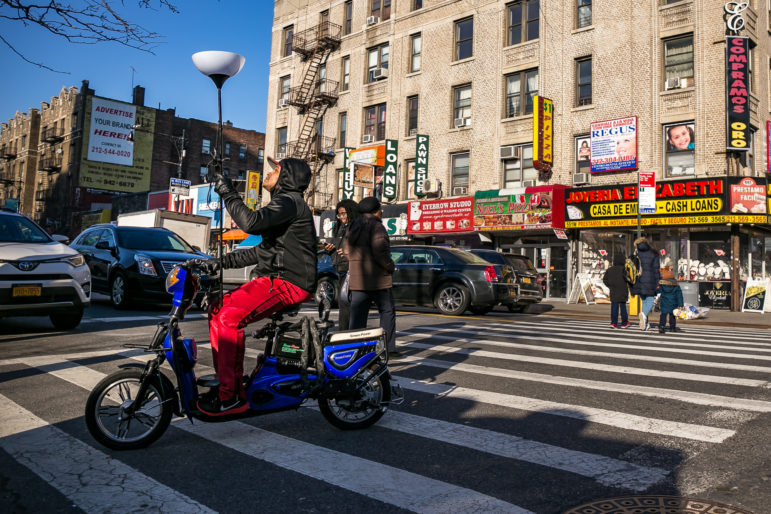
Adi Talwar
Corner of 207th Street and Sherman Avenue.
New York City is the quintessential immigrant city. With 28 percent of the population foreign born and many more second-generation immigrants, the city prides itself as a culturally diverse sanctuary for immigrants.
Northern Manhattan is the epicenter of one such immigrant community—the Dominican community. Dominicans make up about 63 percent of the Latinos in the area, who are 74 percent of the total population. Immigrating to the city at a time when minority enclaves faced urban blight and a vanishing social safety net, Dominicans transformed a once crime- and drug-ridden neighborhood into a thriving community. The streets lined with small, mostly Dominican-owned businesses and the strong community fabric allowed them to elect representation from their own.
Inwood NYC will only exacerbate the existing displacement of Northern Manhattan’s working-class immigrant community. Dominicans are already fleeing steep rent increases here for the Bronx, and those who remain are the most rent-burdened ethnic group, with 48 percent of households paying more than a third of their income in rent. Under the Mandatory Inclusionary Housing that Inwood NYC calls for, three of every four new apartments will be luxury housing, and the few “affordable” units will still be too expensive for the majority of Inwood residents. Rising property values will incentivize landlords of rent-regulated buildings near the rezoning to use egregious loopholes in the rents laws, like preferential rent, to further raise rents and evict tenants.
This rezoning will be disastrous for our immigrant-owned small businesses on 207th St., Broadway, and Dyckman where the rezoning will replace manufacturing areas and small business corridors with high-rise luxury buildings and chain stores. In Inwood, 94 percent of small businesses lease their space and 53 percent of Inwood’s small business owners say their rent is “barely affordable.” These businesses will face increased harassment from landlords who will either only offer month-to-month leases or not renew, besides incentivizing landlords to exercise demolition clauses to build larger buildings. Should the rezoning pass as is, the foundation of the local economy where 53 percent Latino and 29 percent women-owned business reside, will crumble, taking our community along with it. Although $1.23 million is being invested through the Business Improvement District (BID) to boost community “beautification” projects, BIDs have proven hazardous when introduced into immigrant communities. Landlords pass on BID fees to renters, while BIDs feed off wealthy consumers to make large profits, privatize our public spaces, and harass street vendors.
The City Offers an Exciting Coastal Vision For Inwood
By building majority luxury housing and incentivizing commercial property owners to replace small businesses, the city is abandoning the very community that has for years fueled the renaissance of this city. The mayor has continually told us that gentrification is an inevitable process, but isn’t the purpose of government to protect its citizens from displacement and loss of livelihood by implementing policies that address the root issues of institutionalized racism and corporate greed?
We defeated the Sherman Plaza project because it was not truly affordable for our community and by standing together, our councilmember listened. We must stay united and loudly say, with one voice: “NO to the Inwood NYC rezoning plan!” We deserve better.
Paloma Lara and Ava Farkas are members of Northern Manhattan is Not for Sale.









6 thoughts on “CityViews: The City’s Inwood Plans Fail Our Immigrant Communities”
So what is the solution? It seems like a damned if you do damned if you don’t situation.
Paloma Lara and Ava Farkas:
Bravo, very well said.
This is a neighborhood that functions very well as a real community. The City of New York should properly fund it’s schools and library, which gave me the benefit of a good education, but leaves the current generation of youth ill prepared. The City of New York and the NYC EDC should actually listen to residents of this community who are for real affordable housing that this community can afford, but that will also not destroying the fabric of the community and the independent businesses that are so important.
I agree. Gentrification will ruin Inwood. It is weird that there is no appreciation and concern for stable neighborhoods through the city which are threatened with rezoning and development.
.
Pingback: Opinión: El Plan de Rezonificación de Inwood Les Falla a Las Comunidades Inmigrantes - am-se.com
Huge shout out to Paloma and Ava for their work in the community and for telling it like it is. Inwood NYC project is the evidence of things not seen, as Baldwin would put it.
Pingback: Opinión: El Plan de Rezonificación de Inwood Les Falla a Las Comunidades Inmigrantes - lavina-jahorina.com